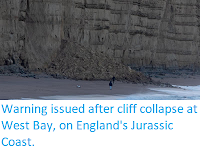A row of caravans at a clifftop resort at Trimingham on the Norfolk Coast of England has left teetering on a cliff edge following a landslip on Monday 6 January 2020. Nobody was injured in the incident, but one woman had to be evacuated from a caravan she was occupying; the incident would probably have been much more dangerous if it had occurred in summer when the area is packed with tourists. Work has begun to drag the caravans away from the cliff edge.
Caravans balancing on a cliff edge following a landslide at Trimingham on the Norfolk Coast, England. SWNS.
The cliffs at Trimingham are considered to be geologically important, being the youngest exposure of the Cretaceous Chalk exposed in England. Like much of the Norfolk coast the area is prone to coastal erosion, as the North Sea batters at the base of the cliffs, wearing away the rocks at the base and undermining the rocks above. Because of the value of the cliffs at Trimingham, measures have been taken to protect them, with wooden sea baffles installed to protect the cliffs from the worst action of the sea.
Part of the sea baffle at Trimingham. The Norfolk Project.
However, these sea defences may have made the area more prone to other forms of clff collapse, leading to a sudden large collapse, as seen this week, rather than an ongoing gradual process. All cliffs are fundamentally unstable structures, with a tendency to bow out and collapse. This is because the rocks at a cliff lack other rocks to one side; burried rocks are pushed down by the weight of rock above, but are generally held in place by the rocks all around them. If the rock to one side is missing, or even under less presure, then they will tend to be pushed in that direction.
Cliff collapse at Trimingham this week, covering the protective sea baffle. BBC News.
In addition the cliffs at Trimingham are made of chalk, a form of soft porous limestone. This is eroded over time by acid in
rainwater (most rainwater is slightly acidic, though pollution can make
this worse), and can collapse suddenly. This can be triggered
by human activity, such as pumping water out (which causes the water to
flow, facilitating acid dissolution of the limestone), but is
essentially a natural process. Heavy rainfall will also speed up such erosion, again by causing water to flow through the rock, facilitating acid dissolution.
The cliffs at Trimmingham are, like many of England's coastal cliffs, of great interest to fossil hunters for the material they produce, predominantly Oysters and Brachiopods. However the Coastguard are urging people to keep away from the cliffs this week, due to the danger of further collapses.
See also...
Follow Sciency Thoughts on Facebook.









